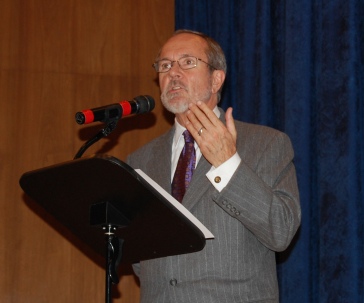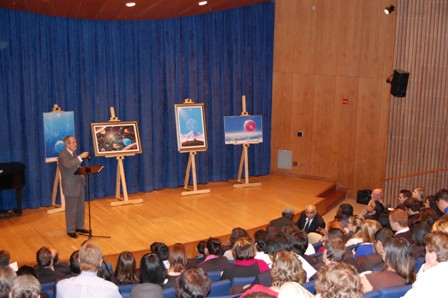President Hultin and Poly faculty take lead at UN Culture of Peace conference
 |
| Special Guest Speaker, Jerry M. Hultin, President |
What can we learn from the 20th century’s place in history as the century with the greatest technological and scientific strides and the greatest amount of bloodshed? That was the central theme of President Jerry M. Hultin’s opening as special guest speaker at the two-day Culture of Peace Student Forum Conference held at the United Nations Headquarters, November 29 – 30.
The Culture of Peace Forum, a group charged with promoting a UN resolution to advance peace throughout the world through education, democracy, tolerance, and the free flow of information, and Up with People, an organization that facilitates student understanding of foreign cultures through emersion study, organized the Culture of Peace Student Forum Conference.
At the conference, students from over 38 countries came together to listen and discuss the wisdom and challenges of UN ambassadors, leading educators, and subject-matter experts as they explored the concept of a “culture of peace” in a globalized world.
Hultin comes at the question of peace from an interesting perspective, which he shared in his speech. He has been tested by war—he was a naval officer in Vietnam and President Bill Clinton’s Under Secretary of the Navy, he is the son of a World War II bomber pilot and prisoner of war, and his grandfather served in World War I. Hultin is also a peace seeker—as a university president he presides over a community with the ability to contribute to a peaceful world through knowledge and information.
Hultin contends though, that knowledge and information aren’t enough. “Universities around the world believe that knowledge and learning are two of the human race’s strongest methods for building a better world,” said Hultin. “If knowledge and information alone were sufficient, the 20th century would not have been history’s bloodiest century and the 21st would not be off to such a bloody start.”
In his speech, Hultin proposed that a more robust approach to knowledge and learning can, in fact, help to build peace. “We at Polytechnic,” said Hultin, “believe that a culture of peace can be developed if knowledge and learning are used with three key ideas in mind:
“Entrepreneurship: give young people the skills to create new products, enterprises and jobs so they and their families have a stake in stability and in a culture of peace.
“Invention and innovation: challenge universities and research corporations to solve the essential problems of sustaining life for the nearly 3 billion people who have access to less than $2 a day, so these people have hope.
“Information: use information—and the ability to link the world—to understand why peace fails and where wars start, so that those who are seeking a culture of peace can have greater impact.”
To conclude his speech, Hultin noted how Poly shares the group’s ambitions. “We are eager for you to succeed,” he said, “and equally committed to use our science and technology to support a world that is not only secure and stable, but thriving and at peace.”
Poly showed it’s committed and displayed its approach to knowledge and learning on the second day of the conference at the panel discussion “Education and Technology” lead by Bruce Niswander, Director of Poly’s Brooklyn Enterprise on Science and Technology, Bharat Rao, Associate Professor of Management, and Carl Skelton, Lecturer of Digital Media and Director of Poly’s Integrated Digital Media Institute.
The panelists presented trends in their respective subject areas, challenging the students to think about how new technologies factor into peace, particularly Web 2.0 applications, i.e., user-driven social networking and media-sharing sites such as Facebook and Flicker. For sure, there are incredible opportunities to encourage understanding of different cultures and promote partnerships through such applications. There is also the reality that those applications can and have been used to incite violence and hate. Wrestling with such issues was exactly what the students were there to do.
Read President Hultin's Culture of Peace speech
“Education and Technology” panel. (From left) Chris Miller, Moderator, Bruce Niswander, Director of Poly’s Brooklyn Enterprise on Science and Technology, Bharat Rao, Associate Professor of Management, and Carl Skelton, Lecturer of Digital Media and Director of Poly’s Integrated Digital Media Institute. |
 | |
| Special Guest Speaker, Jerry M. Hultin, President |




